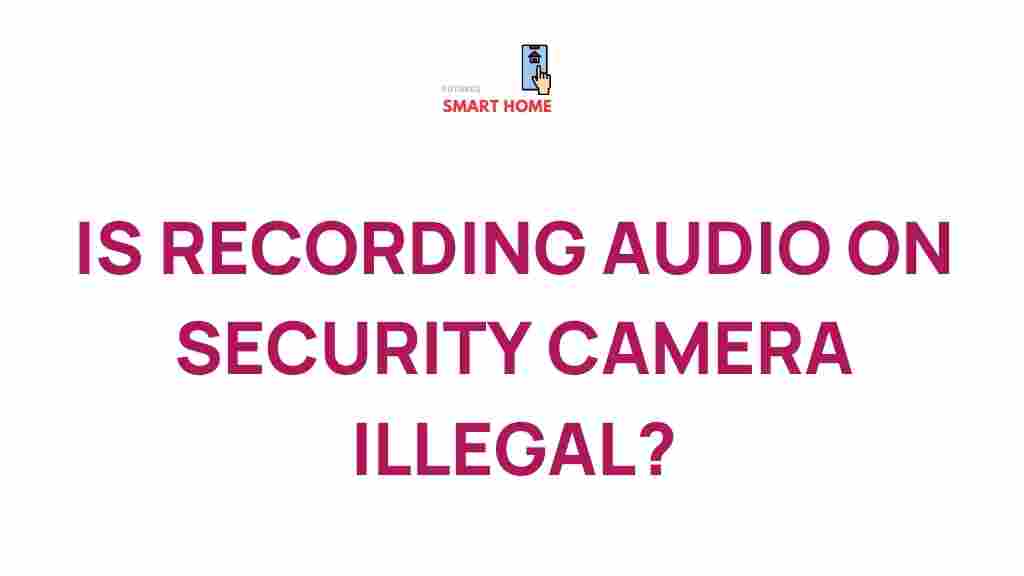Uncovering the Legality of Recording Audio on Security Cameras
In an age where security cameras are becoming an integral part of both residential and commercial properties, the question of recording audio alongside video surveillance is increasingly relevant. The legality of such actions varies greatly depending on location, circumstances, and the specific laws governing privacy and surveillance. This article aims to delve into the legality of recording audio on security cameras, exploring the implications of privacy laws, consent requirements, and applicable regulations.
Understanding the Basics of Security Cameras
Security cameras, also known as surveillance cameras, are used to monitor and record activities in a given area. They serve a variety of purposes, including:
- Deterrence of criminal activity
- Evidence gathering for investigations
- Monitoring employee and customer behavior
- Enhancing safety in public spaces
While video recording is widely accepted, the addition of audio recording raises significant legal and ethical questions. Understanding the regulations surrounding this can help individuals and businesses make informed decisions.
Audio Recording Laws: A General Overview
In the United States, the legality of recording audio varies by state and is influenced by both federal and state laws. Here are the primary factors to consider:
- One-party consent: In some states, only one party involved in the conversation needs to consent to being recorded. This means if you are part of the conversation, you can record without informing the other party.
- Two-party consent: In other states, all parties involved in the conversation must give consent before recording can take place. This means that if you plan to record audio, you must inform everyone involved.
- Public vs. private spaces: The expectations of privacy play a crucial role in determining the legality of audio recordings. In public spaces, individuals may have a lower expectation of privacy, whereas in private settings, such as homes or offices, the expectation is higher.
State-Specific Regulations
Each state has its own laws regarding audio recording. Here are a few examples:
- California: Requires consent from all parties (two-party consent) for audio recordings.
- New York: Operates under a one-party consent law, allowing recording if one party consents.
- Texas: Also follows a one-party consent rule, permitting recordings if one participant agrees.
Before installing a security camera with audio capabilities, it’s essential to research the specific laws in your state or consult with a legal expert.
The Importance of Consent
Obtaining consent is crucial when it comes to recording audio. Here’s why:
- Legal Protection: Consent can protect you against potential legal issues. If someone discovers they were recorded without their knowledge, they may pursue legal action.
- Trust and Transparency: Informing individuals about the recording promotes trust. If people know they are being recorded, they are less likely to feel violated.
- Ethical Considerations: Recording audio without consent can raise ethical concerns. Respect for privacy is essential in maintaining good relationships with employees, customers, and the public.
How to Legally Install a Security Camera with Audio
If you decide to install a security camera with audio recording capabilities, follow these steps to ensure compliance with the law:
- Research State Laws: Understand the audio recording laws in your state, including consent requirements.
- Inform Individuals: Clearly communicate to all individuals that audio is being recorded. This can be done through signage or direct communication.
- Document Consent: If possible, obtain written consent from individuals who will be recorded. This documentation can serve as legal protection in case of disputes.
- Choose Appropriate Locations: Avoid placing cameras in areas where individuals have a reasonable expectation of privacy, such as bathrooms or private offices.
- Stay Informed: Laws can change, so regularly review your state’s regulations to ensure ongoing compliance.
Challenges and Troubleshooting
After installing a security camera with audio capabilities, you may encounter challenges. Here are some common issues and troubleshooting tips:
- Audio Quality: If audio quality is poor, check the camera’s microphone settings and ensure the camera is positioned correctly to capture sound.
- Legal Compliance Issues: If you receive complaints about being recorded, review your consent protocols and signage to ensure compliance with local laws.
- Technical Failures: If the camera is not recording audio, check the connections and settings. Ensure that the audio recording feature is enabled in the camera’s configuration settings.
Conclusion
The legality of recording audio on security cameras is influenced by various factors, including state laws, consent requirements, and privacy expectations. Before implementing an audio recording system, it is vital to be aware of and adhere to the laws that govern your area to avoid legal complications. By ensuring transparency and obtaining consent, you can effectively utilize surveillance systems while respecting individuals’ privacy rights.
For more information on surveillance laws and regulations, consider checking resources from the American Civil Liberties Union (ACLU) or consult legal professionals to stay informed and compliant.
Ultimately, a well-informed approach to surveillance can help balance security needs with respect for personal privacy, creating a safer environment for everyone involved.
This article is in the category News and created by FutureSmarthome Team
